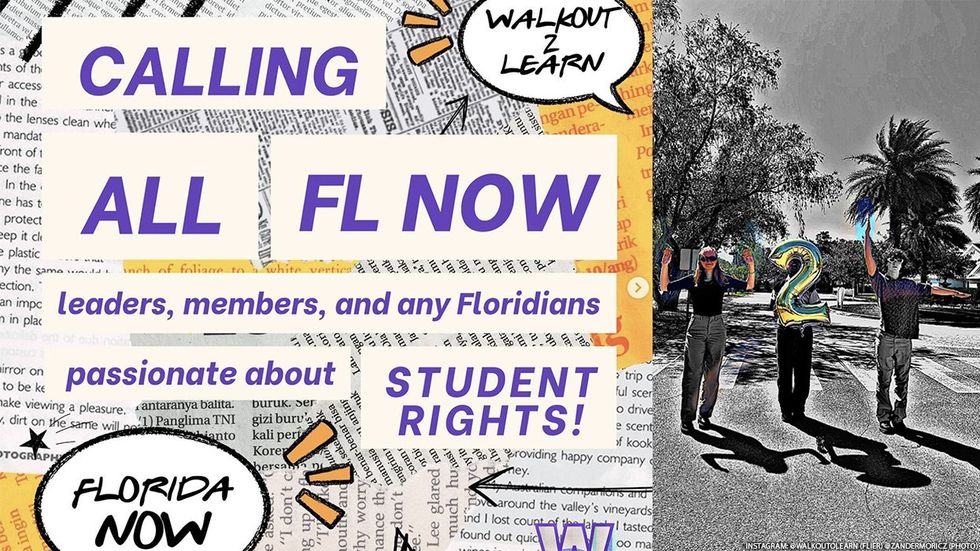In response to what advocates have called an increasing number of anti-LGBTQ+ and anti-education moves by the Florida state government, students across the Sunshine State will participate in the Walk Out To Learn project.
High school and college students are planning to leave class on April 21 to protest what they say is Gov. Ron DeSantis’s stranglehold on learning.
Students from more than 300 high schools and colleges in Florida are expected to participate in the mass walkout at noon on Friday, April 21, Zander Moricz, one of the principal organizers, tells The Advocate. In the evening, rallies with speakers will be held.
The Walkout to Learn project seeks to develop short-term resources and tools while building long-term power to retake the Florida legislature, Moricz says.
As part of the project, students will participate in walkouts and rallies, sign an active voter pledge, take a five-minute lesson on banned policies, and register for a virtual African-American history course. Those who take the history course will qualify for a certificate.
“What this pledge does is it solves the two core problems that typically occur with social justice pledges, which are that typically when they’re signed, they either sit on the internet and go nowhere or if they are set to a politician, they are ignored because you can see that they’re not signed by people who vote,” Moricz says. “So what this does is you’ll sign and say, ‘I’ll never support someone who doesn’t support students’ rights.’”
Moricz adds, “Then it automatically asks you to attach a voter registration status. So if you’re not registered to vote, you can do that on the platform in 90 seconds. Then it packages all of that up and sends it to every elected official from school board to Senate.”
He says that’s why the tool works well for civic engagement.
“Then you’ll sit for a five-minute banned-policy history lesson, which focuses on the policies at play and for those legislatures that are harming different marginalized communities and its impact,” he says.
Moricz explains that then students may “register for a virtual college-level African American history course that is being created by some of the same professors who created the banned AP African American history course, essentially circumventing our governor’s ban entirely and allowing us to provide this resource and education to anyone in the state of Florida without the permission of the governor at the end of this summer.”
Through their advocacy work with the Social Equity and Education (SEE) Alliance, where Moricz is executive director, he and his team of activists have inspired other young people to get involved with direct action initiatives, with many team members joining through social media. He says that young people are tired of seeing the same struggles continually discussed but only a little action being implemented.
Moricz says his group has learned from the tech space to combat this. For example, incubators of people collaborating toward a common goal to get their startup off the ground are standard practices.
“Tech startups scale and grow and change the culture more effectively than almost any other type of organization,” Moricz says. “So a lot of the way that we’re developing and strategizing is based on [that model].”
Moricz anticipates opening a community center called SEE Space in Sarasota this summer. The location will serve as a hub for young people to gather and discuss activism opportunities surrounding education and students’ rights. SEE Space will also make available to students an advanced course on African American history in the U.S., which will incorporate many of the writers and concepts banned by the DeSantis Department of Education, which blocked the College Board’s Advanced Placement African American Studies course because it was deemed too “woke.”
Young people will be brought together to strategize, organize, run door-knocking campaigns, set up phone banks, create voter registration campaigns, and learn from each other.
“A lot of community centers are focused on defensive work, and they need to be, and they must be because safe spaces are being destroyed, but while our community center will be a safe space, it will also be focused on offense,” Moricz says.
Moricz gained national attention last year when he was forbidden from mentioning his sexual orientation in a graduation speech. During the oration, the incoming Harvard first-year student used his “curly hair” as a euphemism for “gay” with a speech that received a lot of attention.
Last year, Moricz was named one of The Advocate’s “Advocates for Change.”















































































